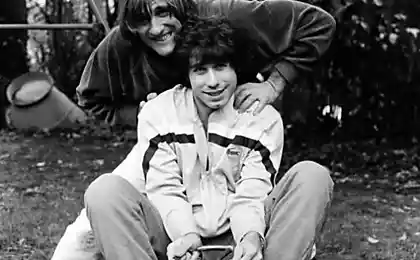1642
10 Biggest Conclusions I’ve Done in a Year of Productivity Studies

Preface by the translator: There are so many books on personal effectiveness and time management in the world that when I started translating, I asked myself, “Is there anything new here that makes this article worth translating and the main thing to read?” At first I thought I answered yes, but the reality was a little more complicated.
Now I think it’s almost impossible to say something new to a person who has read at least 2-3 books on time management and personal effectiveness. But there is a huge gap between the topic. people knowAnd so,what people do. So if you already have some knowledge of personal effectiveness, I advise you to ask other questions instead of “Is this something I don’t know?”:
1. Do I agree with what I wrote?
2. If so, am I doing this?
3. If not, why and what can I do to start doing the right thing?
I’m sure this article will do you much better.
I have to say that I have had great pleasure in following the links in this article, especially those that describe Chris’s experiments (such as switching between 90-hour and 20-hour workweeks). So I decided to keep all these references in the translated article.
I would also like to make a comment for lovers of the beautiful Russian language. I thought for a long time whether to change “productivity” to “performance” and “personal effectiveness” closer to my ear, but I decided to leave it as it is, mainly because of the inability to use the same word in different contexts.
As a final wish, this is a rather long article, so read productively: do not switch between tasks during the reading process; take breaks if you feel tired and lost concentration; write down useful thoughts without hoping for memory.
Enjoy reading!
10 Biggest Conclusions I’ve Done in a Year of Productivity Studies
After I graduated from university in business last May, I got two great job offers that I turned down because I had a plan.
For exactly the year from May 1, 2013 to May 1, 2014, I was going to absorb all the productivity information I could get to and write every day about what I learned on the A Year of Productivity blog.
Over the past 12 months, I’ve done a lot of self-experimentation, interviewed some of the most productive people in the world, and read tons of non-fiction and academic literature on productivity—all to explore how I can be as productive as possible, and then write about my findings.
One year later, with 197 recordings and a million views, I reached the end of my journey.
As the end of my year of productivity, I’ve put together a collection of the main things I’ve discovered while trying to be as productive as possible. Below you’ll find the top 10 lessons I’ve learned over the course of my project; I’ve also written an article about my 100 favorite hacks of time, energy, and attention that I’ve been experimenting with this year.
Without further discussion, Here are the top 10 things I’ve learned over the past year.
10. One of the best ways to be productive is to work on the most effective tasks.
In each of the major areas of your life (such as mind, body, emotions, relationships, career, finances, and pleasure) there are only a few tasks that do the most good. For example, there are likely to be only a few tasks in your work that are 80-90% beneficial to anyone you work for.
One of the best ways to do more is to identify high-performing tasks in each area of your life and focus on them, so these things give you the most value for your time, energy and attention.
9. The three most effective ways to become more productive are the boring tips you’ve heard a million times.
I think that behind every cliché lies a truth so powerful that people feel the need to repeat it over and over again. This is also true for productivity advice.
Over the course of a year, I’ve been experimenting with integrating a huge number of performance habits and techniques into my life, but in the end, the three things that worked best for me are:
1. Proper nutrition
2. Good sleep.
3. Physical exercise
These tips are repeated so often that they are almost no longer accepted. But hear me as someone who has tried hundreds of techniques to manage time, energy, and attention over the past decade: nothing has made me more productive than eating the right food, getting enough sleep, and exercising.1
8. Question all of your productivity recommendations
There are productivity techniques that work equally well for everyone – including proper nutrition, good sleep, exercise, and meditation – but there are exceptions to every rule.
You can reject the conventional wisdom if there is something that works best for you. Find out you work better when you don't have to wake up at 5.30am? Then sleep more! Do you think you do better, not when you do the most important thing in the morning, but when you answer a packet of emails? Then answer the e-mails!
There’s usually a grain of truth in any productivity technique, as well as in every accepted truth, but there are a bunch of productivity techniques that just won’t work for you. Everyone has their own mindset and priorities, so there are no techniques that work perfectly 100% of the time for 100% of people.
So you can (and should) reject any productivity tips if something works best for you.
7. Building the right habits automatically increases your effectiveness.
I believe that one way to become more effective is to turn new, more effective behaviors into habits in order to execute them automatically.
Charles Duhigg, author of The Power of Habit, estimates that 40-45% of what we do every day is automatic habits. Forming a habit is not easy, sometimes it takes several months to integrate a new habit into your life, but once a new behavior becomes a habit, you automatically move to the next level of productivity.
For example, forming the habit of waking up at 5:30 a.m. each morning took me months, but after it happened, it became a cornerstone habit and I started waking up automatically every morning. It took me several weeks to switch to a new diet, but after I did, it became one of many automatic habits in my life.
If you want to learn how to integrate new habits into your life, read my interview with Charles. Forming new habits is not easy, especially when you have to expend willpower to force yourself to change your behavior, but the more you advance, the easier it becomes, and finally you begin to act more productively automatically.
6. There are three ingredients of productivity that you combine: time, energy, and attention.
Towards the end of the project, I realized that any of the articles I wrote fell into one or more of three categories: how to better manage my own work. timeHow to better manage your own energy How to better manage your own attention.
I think all three ingredients are critical if you want to achieve regular productivity. Some people have amazing reserves of energy and concentration, but they don’t know how to manage their time, so they work on the wrong things and don’t achieve much in the end. Some people are good at managing their time and have a lot of energy but are constantly distracted and therefore unable to achieve their goals. Others are perfectly focused and know how to manage their time, but don’t manage their energy very well, so get tired quickly and can’t accomplish much.
Productive people know how to manage all three components.
Interlude. 10 Productivity Experiments I Conducted in a Year of Productivity Studies
1. 35 hours of meditation in 7 days.
2. 70 hours of TED videos for 7 days.
3. Eating only soylent for a week.
4. Living in complete isolation for 10 days.
5. 90-hour workweeks.
6. Switch between formal clothing, business casual and pyjamas for 21 days.
7. Be completely sloppy for a week.
8. Using a smartphone for an hour a day for three months.
9. Drink only water for a month.
10. Day siesta for 3 hours.
5. There is no single secret to productivity, but there are hundreds of tactics you can use to achieve it.
If there's a secret to productivity, I haven't been able to find it in a year of studying productivity and experimenting with it.
What I found were hundreds of tactics I could use to better manage my time, energy, and attention. Actually, I found so many tactics that I wrote. List of 100 of my favoritesTactical when I finished this year.
Productivity is a very global concept characterized by an understanding of its individual interrelated parts. There are hundreds (if not thousands) of factors that affect how much you can do in a day, all of which have to do with your ability to manage your time, energy, and attention.
There is no secret to becoming more productive – there are hundreds.
4. Working too hard will impair your productivity.
In the course of my project, I found that working too hard, or working too hard, completely diminished my productivity.
As a productivity experiment, I spent a month alternating between 90-hour workweeks and 20-hour workweeks. I found that on 20-hour weeks I did about as much as I did on 90-hour weeks. The reason is simple: When I limited the amount of time I could spend on a task, I forced myself to devote more energy in less time, so I was able to get the task done faster..
What happens when you work too hard and spend too much energy on a task? You burn out. (Interestingly, I didn’t find any side effects with increased attention, but I found that attention and energy levels very often rise and fall in sync.) I think of energy as the fuel a person burns during the day to do work. When you spend more energy on work, and don’t take the time to restore and improve your energy in ways like: exercise. breaks. nutritionor Investing in effective strategies to reduce stressYour fuel will run out and you will burn out.
Working too long or too hard completely destroys your productivity because it drains two of your most important resources: your time and your energy.
3. The best way to feel motivated is to know why you want to do something.
The most motivated (and productive) people are those who constantly ask themselves why they do what they do.
When you focus on doing more instead of doing what’s aligned with your goals and what you believe in, you’ll be able to force yourself to be productive in the short term, but in the long run you’ll be less satisfied and productive. The key is to identify your values and what motivates you most, and then take on the tasks and responsibilities that most align with your values.
Just because you’re busy and producing a lot doesn’t mean you’re productive, in fact, I’m willing to say the opposite. Productivity is not about how much you do, it’s about whether you achieve the results that matter most to you.
If you always know why you’re doing something, you’ll be much more motivated and productive.
2. There’s no point in trying to be more productive if you don’t feel good about yourself.
The reason I write so much about self-care is because that part of productivity is the hardest part for me.
When I first started A Year of Productivity, I got into this project because there’s nothing more exciting than being more productive. It was simple at first, and I loved it; I didn’t have to overexert myself, so I didn’t have any trouble getting the job done.
But the project grew, and thousands of visits per month turned into hundreds of thousands of visits, and I started pushing myself to put more effort into writing, experimenting and doing. As a result, I began to enjoy much less.
It’s hard to admit, especially considering how many people would like to be in my position to explore a topic they love and be successful in it. But it only proves how important it is to take care of yourself in the process.
Increasing productivity doesn’t come without effort – you need to work on yourself to get better; but it’s important not to start berating yourself while trying to make positive changes in your life.
You need to constantly monitor how kind you are to yourself, trying to force yourself to do something. Given that 80% of what we think about ourselves is negative, it’s critical to treat ourselves kindly as often as possible, especially when you’re trying to get better.
Some of the tactics that have helped me get better this year are meditation, taking more breaks from work, turning off work several times a day, and developing happiness-enhancing habits.
1. Productivity is not how much you produce, but how much you achieve.
When I first started my productivity year, I created a stats page to accurately reflect how productive I was every day. Every day I wrote down the number of words I wrote, the pages I read, and the hours I worked, because that seemed like a pretty good indicator of how effective I was.
It was harder to make a mistake.
If you're not a factory director, measuring productivity based on the number of units produced gives you a very shallow, limited picture of your productivity. For example, if you find a smart and creative approach to solving a problem – for example, you can rewrite a text to turn 500 words into 100 – simply measuring the number of units produced will show that you have become much less productive.
It’s easy to fall into the trap of measurement and statistics, but when it comes to personal productivity, statistics are secondary. Productivity is not what you do, but what you achieve.
Of course, you need to do highly effective and meaningful tasks; it is also important to know how to manage time, energy, and attention to have more resources to work with. But at the end of the day, when your time, energy, and attention run out, all you have left is what you have achieved and the changes you have made in the world because you have lived a day of your life in good faith.
That's what productivity is.
1 I also wanted to include meditation on this list, but I quickly realized that this practice is not as accessible to most people as proper eating, more sleep and exercise.
Source: habrahabr.ru/post/226465/























